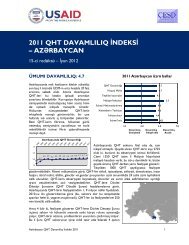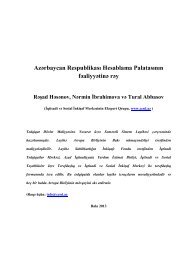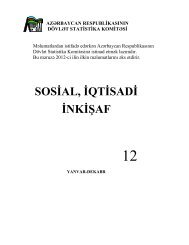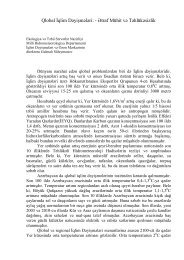- Page 1: THE 500 MOSTINFLUENTIALMUSLIMS2010
- Page 4 and 5: CHIEF EDITORSDr Joseph Lumbard and
- Page 6 and 7: 11. Arts and Culture 155Qur’an Re
- Page 9 and 10: introductionAs an inaugural endeavo
- Page 11: IntroductionThe one clear exception
- Page 15 and 16: I. the house of islamThis section r
- Page 17 and 18: the house of islamTHE CANON OF ISLA
- Page 19 and 20: the house of islamtimeless poetry a
- Page 21 and 22: major doctrinal divisions within is
- Page 23 and 24: III.major ideological divisionswith
- Page 25: ideological divisionsShadiliyyahFou
- Page 29: NotesNotes:1. Orthodoxy in Islam is
- Page 32 and 33: 16. Hajji Mohammed Abd al Wahhab, A
- Page 34 and 35: 1HIS MAJESTY KING ABDULLAHBIN ABDUL
- Page 36: 2HIS EXCELLENCY RECEP TAYYIP ERDOGA
- Page 40: 4HIS MAJESTY KING ABDULLAH II BIN A
- Page 44 and 45: 6HIS MAJESTY SULTAN QABOOS BIN SA
- Page 46: 7HIS EMINENCE PROFESSOR DR SHEIKH A
- Page 50: 9HIS EXCELLENCY PRESIDENTSUSILO BAM
- Page 54: 11HIS EMINENCE SHEIKHABDUL AZIZ IBN
- Page 58: 13HODJAEFENDI FETHULLAH GÜLENTurki
- Page 62: 15AMR KHALEDPreacher and Social Act
- Page 65 and 66: Photographs of Hajji Mohammed Abd a
- Page 68: 18SEYYED HASAN NASRALLAHSecretary G
- Page 71 and 72: as a tool for development. He found
- Page 74: 21HIS HIGHNESS EMIRSHEIKH HAMAD BIN
- Page 78:
23HIS ROYAL EMINENCE AMIRUL MU’MI
- Page 81 and 82:
Photographs of Sheikha Munira Qubey
- Page 84 and 85:
26Mufti Muhammad Akhtar RazaKhan Qa
- Page 86 and 87:
30His Eminence SheikhAbdullah Bin B
- Page 88 and 89:
34Sheikh MohammadAli al SabouniScho
- Page 90 and 91:
38Khaled MashaalLeader of Hamas39Pr
- Page 92 and 93:
42Sheikh Hamza YusufHansonFounder o
- Page 94 and 95:
46His Excellency Mir-Hossein Mousav
- Page 96 and 97:
50His ExcellencyDr Abd al Aziz bin
- Page 98 and 99:
ELBARADEI, DR MOHAMED,EGYPTPolitica
- Page 101 and 102:
the listscontents6. Women p.1247. T
- Page 103 and 104:
SCHOLARLYMiddle East and North Afri
- Page 105 and 106:
ScholarlyPALESTINEal tamimi, his em
- Page 107 and 108:
ScholarlyAsiaAZERBAIJANibrahimoglu,
- Page 109 and 110:
Scholarlyal qadri, dr muhammad tahi
- Page 111 and 112:
ScholarlyCentral AmericaEL SAVADORq
- Page 113 and 114:
POLITICALMiddle East and North Afri
- Page 115 and 116:
PoliticalPalestinian National Autho
- Page 117 and 118:
PoliticalBangladesh’s major polit
- Page 119 and 120:
PoliticalFRANCEbechari, dr mohammad
- Page 121 and 122:
ADMINISTRATIVEMiddle East and North
- Page 123 and 124:
Administrativeal rajhi, sulaiman ab
- Page 125 and 126:
Administrativegovernment service, H
- Page 127 and 128:
AdministrativeCZECH REPUBLICsanka,
- Page 129 and 130:
AdministrativeOceaniaNEW ZEALANDgha
- Page 131 and 132:
LINEAGEMiddle East and North Africa
- Page 133 and 134:
PREACHERSMiddle East and North Afri
- Page 135:
PreachersUNITED KINGDOMul haq, abu
- Page 138 and 139:
Women’s Issuesyassine, nadiaNadia
- Page 140 and 141:
Women’s IssuesMALAYSIAanwar, zayn
- Page 143 and 144:
YOUTHMiddle East and North AfricaEG
- Page 145 and 146:
PHILANTHROPYMiddle East and North A
- Page 147 and 148:
DEVELOPMENTMiddle East and North Af
- Page 149 and 150:
DevelopmentSouthern AfricaSOUTH AFR
- Page 151 and 152:
Developmenteconomic think tank in A
- Page 153 and 154:
DevelopmentUNITED KINGDOMazmi, dr w
- Page 155:
Developmentlatif, imam khalidImam K
- Page 158 and 159:
Science, Technology, Medicine, LawP
- Page 160 and 161:
Science, Technology, Medicine, Lawz
- Page 162 and 163:
Arts and CultureQATARhusain, maqboo
- Page 164 and 165:
Arts and CulturePAKISTANjamshed, ju
- Page 166 and 167:
Arts and Culturemos defMos Def—bo
- Page 168 and 169:
Quran RecitersAsiaINDONESIAulfah, h
- Page 170 and 171:
Mediakuttab, daoudKuttab is an inte
- Page 172 and 173:
Medianahdi, fuadFuad Nahdi is found
- Page 174 and 175:
Radicalshaqqani, sirajuddin [new]Ha
- Page 176 and 177:
International Islamic NetworksHezbo
- Page 178 and 179:
Issues of the DayInterfaithGLOBALth
- Page 180 and 181:
Issues of the DayUighur Chinese Rel
- Page 183 and 184:
GlossaryAhl Al Bayt (or Aal Al Bayt
- Page 185 and 186:
GlossaryShi’i fiqh. Also referred
- Page 187:
APPENDIX=The Muslim world spans far
- Page 190 and 191:
184
- Page 192 and 193:
AppendixContinentUnited Nationssubr
- Page 194 and 195:
AppendixContinentUnited Nationssubr
- Page 196 and 197:
AppendixContinentUnited Nationssubr
- Page 198 and 199:
AppendixContinentUnited Nationssubr
- Page 200 and 201:
AppendixContinentUnited Nationssubr
- Page 202 and 203:
196
- Page 204 and 205:
198
- Page 206 and 207:
Not Listed in 2010CATEGORY COUNTRY
- Page 208 and 209:
Not Listed in 2010CATEGORY COUNTRY
- Page 210 and 211:
Not Listed in 2010CATEGORY COUNTRY
- Page 213 and 214:
IndexAfghanistanBarakzai, Shukria 1
- Page 215 and 216:
IndexCote d’IvoireAbdoulaziz, She
- Page 217 and 218:
IndexDjalal, Dr Dino Patti 111Ebadi
- Page 219 and 220:
IndexMoroccoAbdul-Rahman, Prof. Dr
- Page 221 and 222:
IndexAl Saud, His Majesty King Abdu
- Page 223 and 224:
IndexAl Nahyan, His Highness Sheikh
- Page 225:
note on format -
















